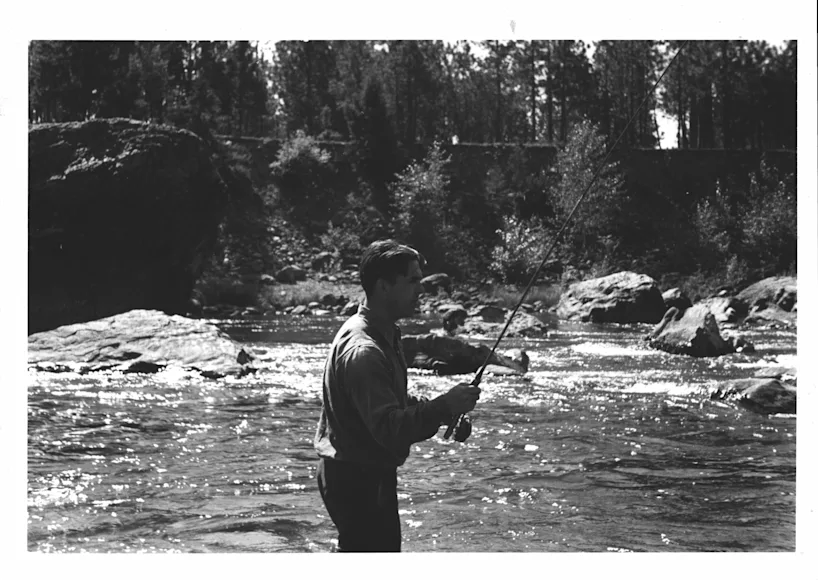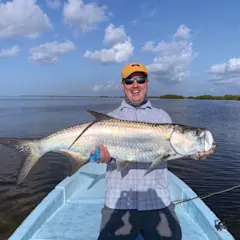Here’s a fact: Were it not for A River Runs Through It_—the novella and the film—I wouldn’t be here, writing this introduction to the interview I’m about to share. The circumstances under which I discovered that book and movie is another story for another time, but I’ll say this: I was 16 years old, and that discovery kickstarted an out-of-nowhere obsession with fly fishing that would take me all over the country (including, yes, a brief residence in Montana) and ultimately to this job at_ Field & Stream_. I know it’s cliché to say, “This book/film changed my life,” but in the case of_ A River Runs Through It_, it’s the truth. I mention all of this because when I learned that John N. Maclean—the son of Norman Maclean—had written a new book,_ Home Waters
, and that the book is a companion to A River Runs Through It_, well, you can imagine my excitement._
The prose in Home Waters, which is often transporting, flows with a shadow-cast grace. What’s more, John Maclean generously welcomes the reader into his family. We follow the Macleans on their journey to Montana. We listen to Norman Maclean tell stories around a campfire at their family cabin on Seeley Lake. We learn the tragic truth about what really happened to Paul Maclean. And, of course, we go fishing with the Macleans on their home waters—the Big Blackfoot River. The best word I can think of to describe Home Waters also happens to be the Maclean’s family word: beautiful.
Home Waters: A Chronicle of Family and a River _is available online
and in bookstores now. You can read an excerpt from the book here
. What follows is an interview Maclean and I had over Zoom in April. It has been edited and condensed for clarity._
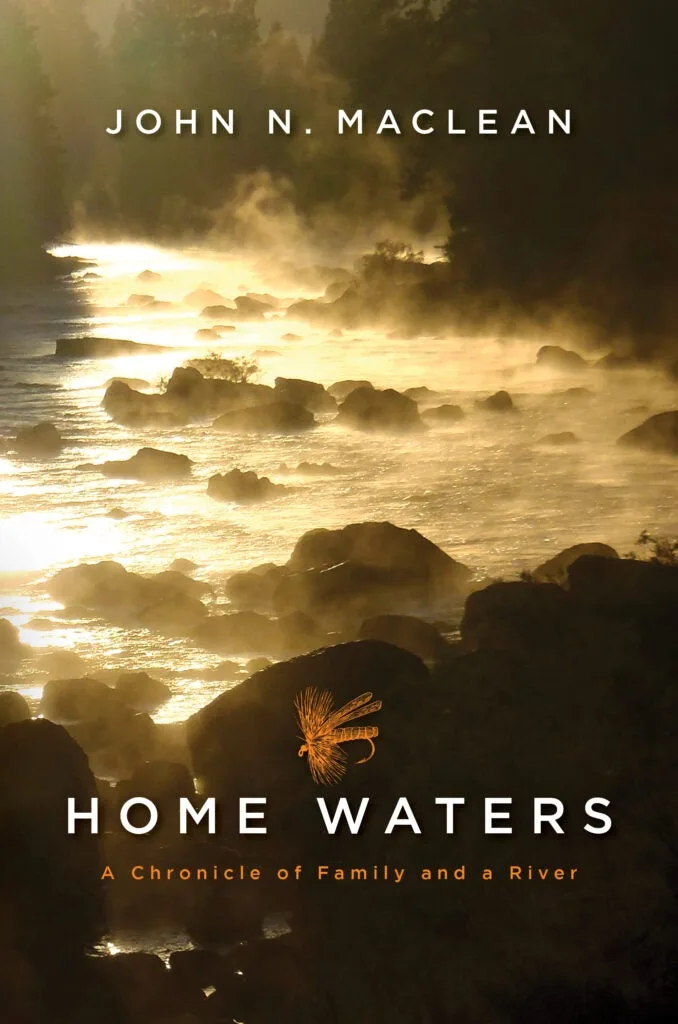
“Home Waters: A Chronicle of Family and a River” by John N. Maclean is now available wherever books are sold. Custom House
Colin Kearns: I loved your book, John. When and why did you decide to write it?
John N. Maclean: Well, it started out just as a fish story. I caught the fish, and felt the things that I felt. Then my friend who was with me said a couple of days later, “Would you write that story for my angling group in Chicago?” So I did, and it was kind of fun. And this friend of mine read it and said, “Why don’t you write that for Big Sky Journal magazine in Montana? That’s a pretty good story. Good Montana story.” So, I wrote it for the magazine.
A couple of years went by, and an editor from Harper Collins, who had been on vacation in Montana, picked up that old copy of Big Sky Journal, and there was my story. He called me and asked if I wanted to write a book. I was doing another book at the time but needed a break from it. So I started writing this book, and it just kept growing.
CK: Regarding the trout in that fish story you’re talking about—when you hook into that rainbow, are you thinking of your dad and your family in the moment? Or is it more just, like, I have to get this fish in the net, and then the reflection comes afterward?
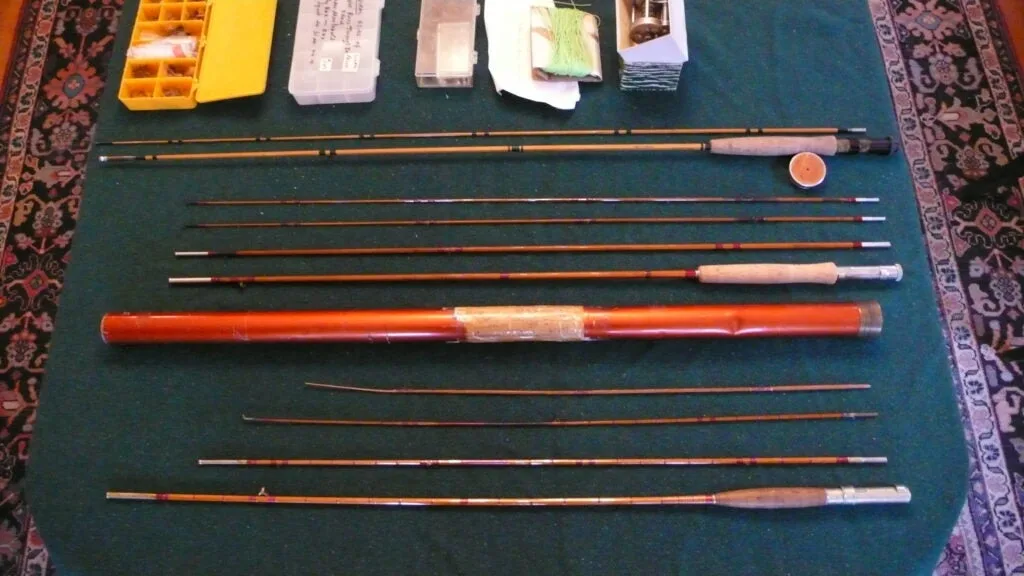
A display of Maclean family fishing gear and bamboo rods. From bottom to top: the Rev. Maclean’s H.L. Leonard; Norman Maclean’s Granger Champion; and the author’s custom-built rod. John Maclean
JNM: Well, it was one hell of a big fish. He occupied my attention. It was on the Muchmore Hole, which, every time I fish there, I look at that little island where my dad landed a great big rainbow. The foam is still there; the hole is exactly the way he describes it in his book. That’s the only hole on the Blackfoot that is for sure described in A River Runs Through It.
CK: What is it that makes the Big Blackfoot River so special to you and your family? In a way, it seems like it’s the ultimate “home waters” for the Macleans.
JNM: Absolutely. The Blackfoot has some characteristics that make it special. The upper Blackfoot—once you get out of the Blackfoot Canyon, near Lincoln—runs up against the Granite Mountains. It has a very stable pattern to it. It can’t go anywhere, it’s pushed right up against the Granite Mountains and those holes are going to be there just exactly the way they were 50, 100, 1,000 years ago. So, it has this stable characteristic. It’s also remote. You can get away from everything on the Blackfoot River.
Now, you aren’t going to catch a lot of fish on the Blackfoot. If you want to go out and have the experience of fly fishing that you and I are talking about—where something captures your inner self, sustains you—then you go to the Blackfoot.
CK: Do you still feel that when you fish the Blackfoot?
JNM: Oh, absolutely—but it’s tricky. I can get that feeling there, because I know how to do it. I can be alone on the river for hours. But, you have to know what you’re doing. You have to figure all this stuff out. If you just go down there and fish like everybody else, you’re not going to get that.
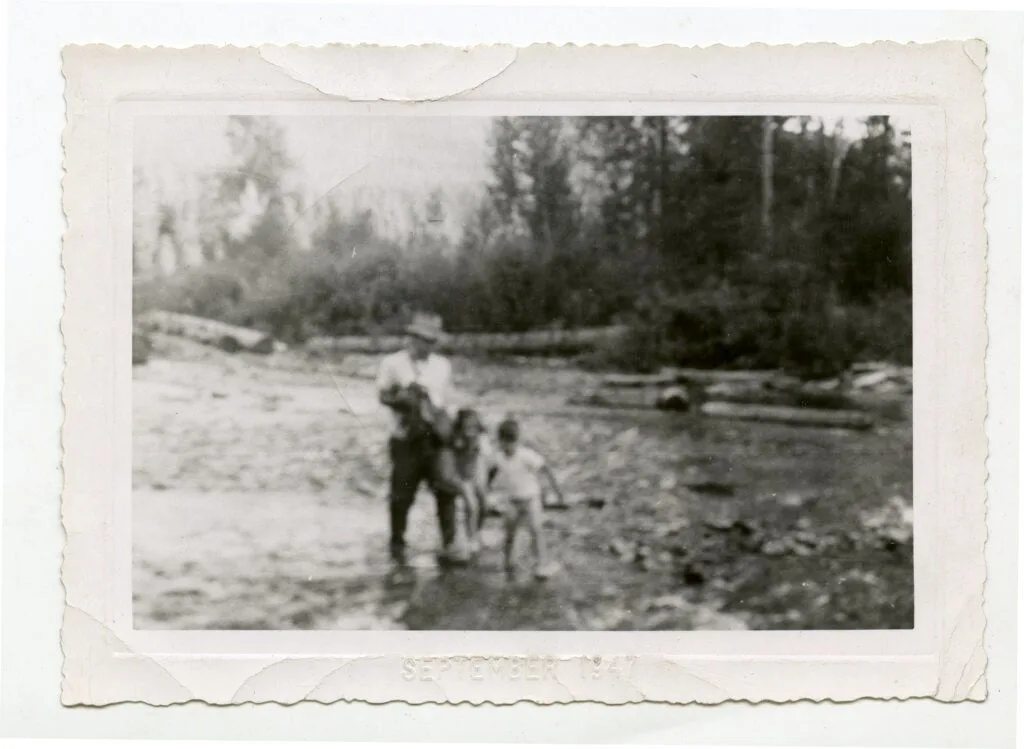
Norman Maclean takes his children, Jean and John, fishing on the Blackfoot River. John Maclean
CK: I had a powerful experience with this one line in your book that reminded me of a very similar experience I had with another in your father’s book. In each book, there was this one sentence that really hit me. In your dad’s, it was this: “Help is giving a part of yourself to someone who comes to accept it willingly and needs it badly.” I’ve always thought that was such a beautiful sentiment. And in your book—shortly after the prologue, when you hooked into your first rainbow trout—you write: “For the first time, but not the last time in my fishing career, my father became part of the battle.” John, I just found that to be such an unbelievable sentence. So, I guess my question is: Where does a line like that come from?
JNM: Well, it comes from awful lot of experience. I mean, he was like that. He would do that. It made you feel trampled on. He made you feel exulted. It gave you a sense of companionship that didn’t exist anywhere else, at any other time. It was a great mixture of many, many things.
CK: Yeah, there’s a lot going on in that sentence, and I think that’s why it stuck with me. I have a very close relationship with my father, but we’ve had our battles, too. And I think what you did there was just stunning. As a reader, I’m always grateful when I can have an experience like that and connect with the writer.
JNM: It’s fun to think back on that, because it was a distillation of an awful lot of times when that happened, and all the different things that it caused. But my dad could do that and he did it in other ways, too—where you’d be going along, thinking you’re just on a fishing trip and kicking stones and catching fish, and the next minute you’re in the middle of something that was very profound.
CK: Yeah. That entire scene in the book—with the fish and then the hailstorm afterwards—it’s so rich and detailed. I really felt that I was there; when your dad picks you up and puts you on his shoulders, and you described the smell of the oil on his hat. I’m curious how you approached and handled memory throughout the book. How do you remember such lovely details like that?
JNM: Well, that story was, to me, a gift of the book. I had tried to write that story for decades. When I quit the Chicago Tribune in 1994, I went out and spent a lot of time in Montana, and I would go back to the place where that happened and relive it and then go back to the cabin and try to write it and I couldn’t write it.
I tried over and over again. Why the hell can’t I write this? But when I was determined to do the book and got to the place in the book where that scene was appropriate, the writing just happened. It took me about three days to write. Then you refine it after that, but it just flowed because I had a deadline and I had to do it. I think that’s very important in writing. There’s a time to do these things, and a time not to do them. And when I first got back to Montana, it was not the time to do it. I wasn’t there yet. I hadn’t made that whole connection. But after the connection had been made, and after I had established an independent literary career and caught the big fish, and done all those things and gotten a good assignment and deadline, then it was time to do it.
I’m glad you picked that out, because in some ways, it’s my favorite story in the whole book.
CK: I’ll admit that when I started your book, I thought it was just going to be this nice fishing memoir. But as I got deeper into it and discovered that you were giving all of this backstory to your family—this family that I sort of felt like I grew up with, because of your dad’s book and the movie—the reading experience took on another level of excitement and discovery. What was the research and reporting process like for this book? What was that journey like?
JMN: It was a journey of a lifetime. I have been writing little sketches, anecdotes, and eulogies—parts of which wound up being reworked into the book. Other parts of the book I had never written before, like the story of my first fish, and the Meriwether Lewis trip to the Blackwood Valley. The total time involved has been three years.
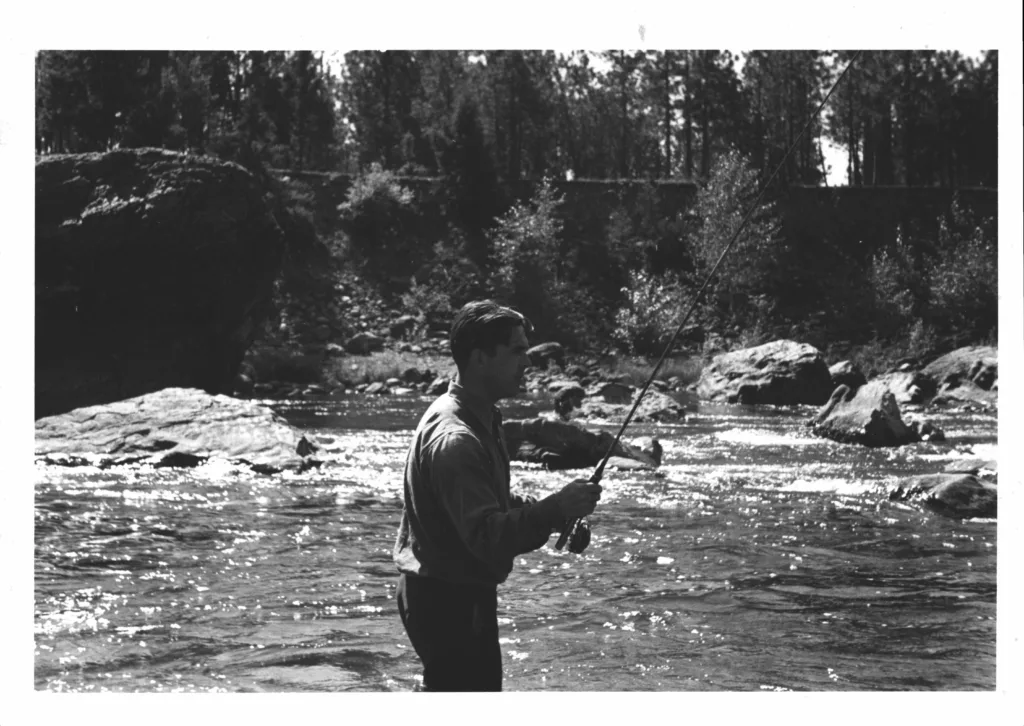
Paul Maclean fishing the upper Blackfoot River. Norman Maclean
CK: You write a lot about Paul—your father’s brother, your uncle. I don’t want to give away too much here, because fans of your dad’s book, and the film, will certainly find those chapters and passages surprising. But what sort of presence did he have in your life?
JNM: He was a mystical, mythical character, but he was ever present—always, always, Paul. And you could never be as great a fisherman as him. My dad was going to name me Paul, but my mother intervened. But there was an obvious parallel between us. I became a newspaper reporter, just as he had been, and writer, and a fisherman.
He was really tough about fishing. He was extremely aggressive and utterly contentious of anybody who didn’t live up to the mark. If you failed to bring along a reel or something like that, you didn’t deserve to fish. Screw you, and he went off on his own. He fished competitively and would bet on anything like, who gets to those fish, who gets the biggest fish. He was ready to take on anybody.
CK: I have to talk to you about this scene in your book: You’re in Michigan, and there’s another storm going on, and your father gives you and your wife his manuscript of A River Runs Through It to read for the first time. What was it like to read that?
JNM: It was hard to fully realize what he’d done. But, it was so obvious from the opening lines to that magical ending: This is great literature. My wife and I had read some of his other stories, and commented on them: “Yeah, this thing meanders around, you need to sort it out a little.” But with A River Runs Through It, we told him, “This is perfect.”
CK: Toward the end of your book, you have this amazing passage where you explain what fishing means to you and the reasons why you fish—as a link to the past, as a connection to the land and the water, as a way to continue what fishing means to the legacy of your family, and how all of that matters more than the size of the fish, or the number of fish you catch.
The older I get, and the more I fish, the more fly fishing means something very different to me than it did when I was a teenager or in my 20s. It’s becoming much more meaningful and personal. But then I read that passage of yours and I thought, I’ve got a lot more to figure out. How long did it take you to learn that about fishing?
JNM: My dad talked to me about fishing one time, and said fishing is a good sport because you can carry on with it for your entire life. Frankly, when you can’t do it anymore, you can still write about it and think about it. I think that’s part of its joy and its meaning. When you’re a kid and you fish, the size of the fish in your basket means everything. I’m not saying that doesn’t count for me now, but other things have become more important. Fishing is different things at different times, and hopefully, if you stick with it for a long time, you’ll get more out of it. And if you don’t, maybe you should go play golf.

